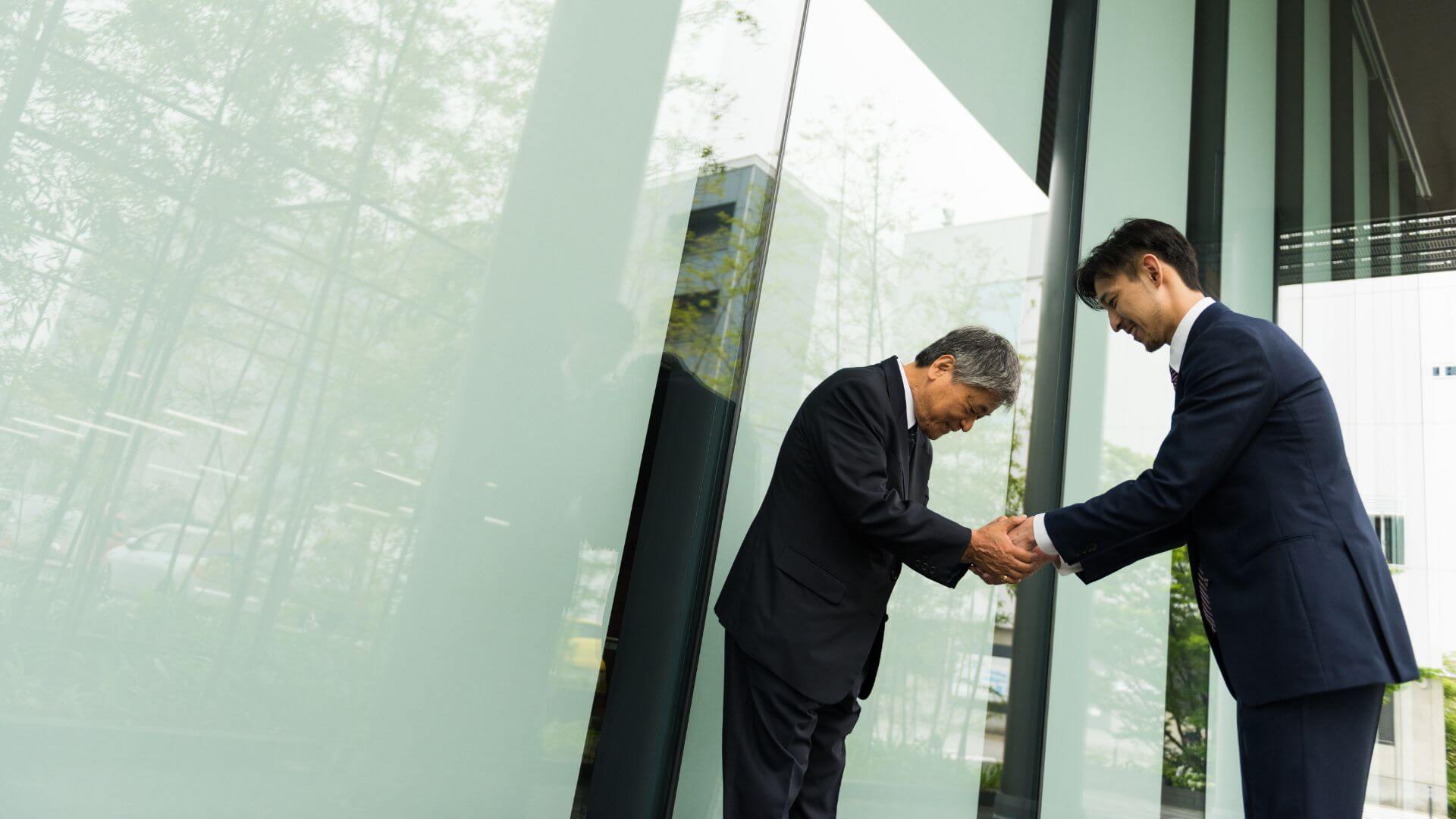Getting to know the Japanese language goes beyond just saying ‘Konnichiwa.’ There are 21+ unique ways to greet someone in Japan, and each one fits different situations, from formal business meetings to casual chats with friends. Understanding these greetings gives us more than just new words. It opens a door to the complex social rules and cultural norms that shape how people interact in Japan. What might look like a simple ‘hello’ can actually tell you a lot about the relationships and context of a conversation.
Formal Greetings in Japanese

In Japan, it’s really important to use the right greetings when you’re in formal settings. You show respect and professionalism that way. You’d say ‘Konnichiwa’ to mean Good afternoon, ‘Ohayō gozaimasu’ for Good morning, and ‘Konbanwa’ for Good evening, depending on the time. Learning and using these greetings properly can really make a difference when you’re meeting someone for the first time or dealing with people in a professional environment.
| Japanese Greeting | English Translation | Meaning/Explanation |
| いかがお過ごしですか (Ikaga osugoshi desu ka) | How have you been? | A polite and thoughtful way to ask about someone’s well-being, showing care and respect. |
| ごきげんいかがですか (Gokigen ikaga desu ka) | How is your mood today? | A formal greeting that expresses a deep interest in the person’s emotional state or mood. |
| ご挨拶申し上げます (Goaisatsu moushiagemasu) | I extend my greetings | A very formal and respectful way to greet someone, often used in written or business contexts. |
| 良い一日をお過ごしください (Yoi ichinichi wo osugoshi kudasai) | Please have a good day | A formal greeting that expresses hope for the person’s well-being and a positive day ahead. |
| ご無事を祈ります (Gobuji wo inorimasu) | I pray for your safety | A formal greeting expressing deep concern for the person’s safety and health, often in serious situations. |
| ご健康をお祈り申し上げます (Gokenkou wo oinori moushiagemasu) | I wish you good health | A formal and respectful greeting that conveys best wishes for health and happiness. |
| 平和をお祈りします (Heiwa wo oinori shimasu) | Wishing you peace | A deeply meaningful greeting expressing the hope for peace and calm in the other person’s life. |
| 感謝の気持ちを込めて (Kansha no kimochi wo komete) | With deep gratitude | A formal greeting that expresses heartfelt thanks and gratitude toward the person being addressed. |
| 皆様にご挨拶申し上げます (Minasama ni goaisatsu moushiagemasu) | Greetings to everyone | A formal way to greet a group of people, showing respect and inclusion to all present. |
| このご縁に感謝いたします (Kono goen ni kansha itashimasu) | I’m grateful for this connection | A deeply respectful greeting that expresses gratitude for the relationship or opportunity to meet. |
Casual Greetings in Japanese

Understanding casual greetings in Japanese can really show you how friendly and relaxed personal conversations are. When friends or family talk, they often say ‘Ohayou’ (おはよう), which means ‘Good morning,’ or ‘Genki datta?’ (元気だった?), asking ‘Were you well?’ These greetings are short but important for everyday chats, helping everyone feel close and comfortable.
| Japanese Greeting | English Translation | Meaning/Explanation |
| やっほー (Yahho) | Hey! | A fun and lighthearted greeting, often used between friends to show excitement or surprise. |
| どうも (Doumo) | Hi there | A versatile and casual greeting, used to say hello without formality, showing friendliness and ease. |
| おっす (Ossu) | Yo! | A casual and energetic greeting, mostly used between male friends to express camaraderie. |
| こんにちはっす (Konnichiwassu) | What’s up? | A playful variation of “konnichiwa,” adding a casual and informal twist, common among younger people. |
| ひさしぶり (Hisashiburi) | Long time no see | A casual way to greet someone after a long time, reflecting warmth and friendship. |
| よう! (You!) | Yo! | A short and informal greeting, perfect for close friends or when wanting to keep things casual. |
| 元気? (Genki?) | How are you? | A casual greeting asking about someone’s well-being, showing genuine care for the other person. |
| おつかれ (Otsukare) | You must be tired | A familiar greeting often used after work or a shared activity, acknowledging someone’s effort casually. |
| どうしてた? (Doushiteta?) | How’ve you been? | A warm and friendly way to greet someone you haven’t seen in a while, expressing interest in their life. |
| よ!久しぶり (Yo! Hisashiburi) | Hey! Long time no see | A combination of casual and friendly greetings, perfect for reconnecting with friends. |
Unique and Informal Expressions

The Japanese language has some fun, informal ways to say hello that show how close its culture is. You might hear ‘Yaa’ and ‘Yo’ among friends. It’s casual and easy. ‘Ossu’ is also popular, especially with young guys and in sports. It’s a lively way to greet each other. These phrases help people show friendliness and ease instead of sticking to formal ways all the time. If you’re learning Japanese, try using these casual greetings. It’ll help you fit in better and get a real feel for the culture.
| Japanese Expression | English Translation | Meaning/Explanation |
| おっす!(Ossu!) | Sup! | A cool and energetic greeting, often used among friends, especially in casual and relaxed situations. |
| よー (Yo) | Hey! | A short and simple greeting, perfect for casual conversations with friends, adding a fun vibe. |
| ういっす (Uissu) | What’s up? | A laid-back and casual greeting that’s often used in everyday conversations between close friends. |
| やあ (Yaa) | Hi there! | A friendly and informal way to greet someone, typically used when you’re comfortable with the person. |
| ハロー (Harou) | Hello! | A casual, playful twist on the English “hello,” often used in more relaxed or light-hearted moments. |
| げんき?(Genki?) | You good? | An informal way to ask how someone’s doing, showing care and interest in a casual tone. |
| ちわっす! (Chiwassu!) | Yo, afternoon! | A casual version of “konnichiwa” (good afternoon), making it more playful and friendly. |
| やっほー (Yahho!) | Heyo! | A cheerful and energetic greeting used to add a fun and spontaneous vibe when meeting friends. |
| ひさ!(Hisa!) | It’s been a while! | A very casual and shortened form of “hisashiburi,” expressing joy at seeing someone after a long time. |
| どうもどうも (Doumo doumo) | Hey hey! | A playful and repetitive greeting that adds a touch of fun and excitement, often used when happy to see someone. |
Also Read: 25 Unique Ways To Say “Goodbye” In Japanese
Japanese Phrases for First Meeting

Here’s a table with common Japanese greeting phrases for a first meeting. This table provides useful phrases for first meetings in Japanese. It will help you navigate introductions in formal or casual situations.
| Japanese Phrase | English Translation | Meaning/Explanation |
|---|---|---|
| 初めまして (Hajimemashite) | Nice to meet you | Used when meeting someone for the first time; it conveys that you are introducing yourself. |
| こんにちは (Konnichiwa) | Hello/Good day | A common greeting during the day, similar to “Hello.” It’s polite and neutral. |
| よろしくお願いします (Yoroshiku onegaishimasu) | I look forward to working with you/Please treat me well | Commonly said after introductions, this phrase expresses goodwill and hopes for a positive relationship. It’s also used in various formal contexts. |
| どうぞよろしく (Douzo yoroshiku) | Pleased to meet you | A more casual version of “Yoroshiku onegaishimasu,” often used after introductions. |
| お元気ですか (Ogenki desu ka) | How are you? | A polite way to ask about someone’s well-being during an introduction. |
| 私の名前は[Your Name]です (Watashi no namae wa [Your Name] desu) | My name is [Your Name] | A simple self-introduction phrase for stating your name. |
| こちらは[Person’s Name]さんです (Kochira wa [Person’s Name]-san desu) | This is Mr./Ms. [Person’s Name] | Used when introducing another person in a formal setting. |
| どうぞ (Douzo) | Please/Here you go | A polite phrase used to encourage someone, like offering a seat or presenting something. |
Conclusion
In summary, the Japanese language has many ways to say hello, each fitting different situations and levels of formality. From the polite ‘Ohayō gozaimasu’ to the casual ‘Ossu’, these greetings show much about Japanese culture and manners. Knowing how to use these different hellos can make communication smoother and show respect for Japanese customs. It’s really important for anyone learning the language to get these right to connect well with others in Japan. Keep visiting the Translation Blog for more articles like this.

